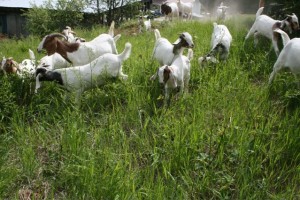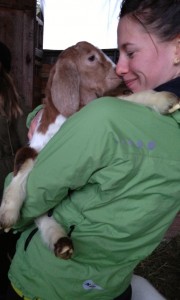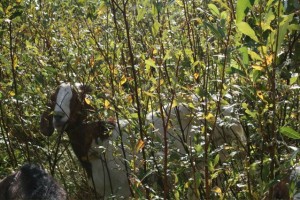My mum Sarah is an urban farmer. She is a sustenance farmer, and has always grown vegetables, fruits and herbs for our family. She has a little flock of chickens in the backyard that produce eggs, and she cans, dries, preserves and freezes an impressive amount of the food we eat at home. She saves seeds, builds her own soil, and knows more about sustainable agriculture than most of my professors combined.
Recently, Sarah decided she wanted to try raising goats. She bought 8 females from a farm nearby in the Kootenays, and shortly afterwards, she bought her first breeding male, a billy goat named Uncle Buck. Sarah worked out an arrangement with the local ski hill, Red Mountain Resort, where in exchange for some space on the mountain for the goats, my mum would provide a goat-brushing service. The goats lived on the hill, and every day my mum would go up, feed them some pellets, fill their water troughs, and check to make sure the fences were still intact. Every two or three days, Sarah would move the fence, so the goats had access to fresh brush to munch on. After the goats grazed on the brush, the brush would slowly die back, so the ski hill did not have to pay people to take it all out with a chainsaw. Some friends of my mum offered her their unused barn to store the goats in the winter, and they lived there whenever they were not up at the hill, brushing away.
By the spring, the herd had swelled to 22 goats. Sarah planned to raise the kids until they were older, and then use them for meat animals.
The arrangement was working out really well. For the last two years, Sarah has had her goats up at the ski hill during the summer. Not only do the goats provide a service to the skill hill, but the cost of raising meat animals decreases significantly when land does not need to be purchased. The barn is an absolutely incredible spot of good luck, as it has worked out to be a free home for the goats in the winter.
However, recently my mum received some bad news. The dear friend who owns the barn where the goats live during the winter found out that because the goats live on his property, his property insurance would double. The insurance company claimed that insuring the goats would cost as much as insuring the approximately $400,000 house, it’s contents, the out buildings, and the liability insurance associated with the property, because of the potential damage to neighboring properties that the goats could cause.
The strange thing to me is that all two of the neighbouring properties are farms, one of which has a herd of cattle and the other has horses. The property with the barn on it is on the Agricultural Land Reserve, which means that the property is zoned as farm land. My mum explained to me that because she is not selling her goats, she cannot really afford the insurance on top of what she pays for feed and medical costs. She cannot add the goats to her property insurance, which would be cheaper, because although technically they are her property, they do not live on our land. Horses, chickens and dogs do not require extra insurance, although they are just as likely to destroy neighboring property as goats are. The cost does not appear to change depending on the number of goats that live on the property either.
So, what does this mean for small-scale or sustenance farmers like my mum? It increases the cost of raising your own animals. It means that for farmers establishing businesses, the cost of property insurance will probably prove to be unaffordable. It means you probably cannot afford to raise your own animals, even if you have the land and infrastructure to do so. And for consumers, it means that the availability of humanly-raised, free-range, local, organic food is even harder to get then it needs to be. We should be encouraging people to farm on unused land, but issues like this deter new farmers from starting out. Even if you have liability insurance for your small business, if you have animals on someone else’s land, their property insurance will increase.
The insurance companies decided that the goats my mum raised carry more risk then the entire homestead they live on (or horses or dogs), and in making that decision, they have priced a small-scale farmer out of her environmentally-friendly brushing and sustenance farming business.
In my program, we talk a lot about food security. We talk a lot about our food system, and about how best to improve it. The truth is, the best way to improve food security is to get involved in the food system, to grow a garden, raise chickens, maybe have some goats. Unfortunately, insurance companies in British Columbia are making that impossible, and this is an issue that we need to address if we want to see more small-scale farmers in our neighbourhood.






